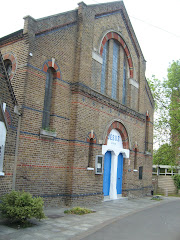William Rickard was pastor of the church from its beginnings in the 1860s until he preached his last sermon here in 1894. For more than a quarter of a century he was a stalwart of the faith, tireless and dedicated in all the work. Sadly, he died not very long after leaving Childs Hill. In the church minutes we read the following account.
“The last three or four years of his life were spent in much suffering. In March 1893 he had to go into hospital and underwent a serious operation. After six months leave of absence from the church he seemed to have recovered, and resumed his loved work; but his recovery was only for a short time, for increasing weakness at length necessitated his resigning the pastorate, and on Sunday September 23rd 1894 he preached his farewell sermon from Acts 20:26, 27: ‘Therefore I take you to record this day, that I am pure from the blood of all men. For I have not shunned to declare to you all the counsel of God’, and 2 Corinthians 13:11: Finally, brethren, farewell. Be perfect, be of good comfort, be of one mind. Live in peace and the God of peace will be with you’. The chapel on that occasion was crowded almost to suffocation, many having to go away not being able to find even standing room in the porch or on the staircases.
“Less than a month from his retirement he was taken ill and lingered in much bodily suffering until called to higher service on January 21st 1896. The funeral took place on the Saturday following when nearly the whole of the village seemed to go into mourning. The coffin was borne in and out of the chapel and to the grave by members of the Fire Brigade. Hundreds attended the Marylebone Cemetery (notwithstanding the rain) to show their love and respect to one who had for so many years been their friend, and who had loved and served them to his utmost.
“Thus closed upon earth the life of one who was faithful to his God. May we who serve the same Lord and Master be equally as faithful. ‘Blessed are the dead which die I the Lord from henceforth. Yes, saith the Spirit, that they may rest from their labours and their works do follow them.’




